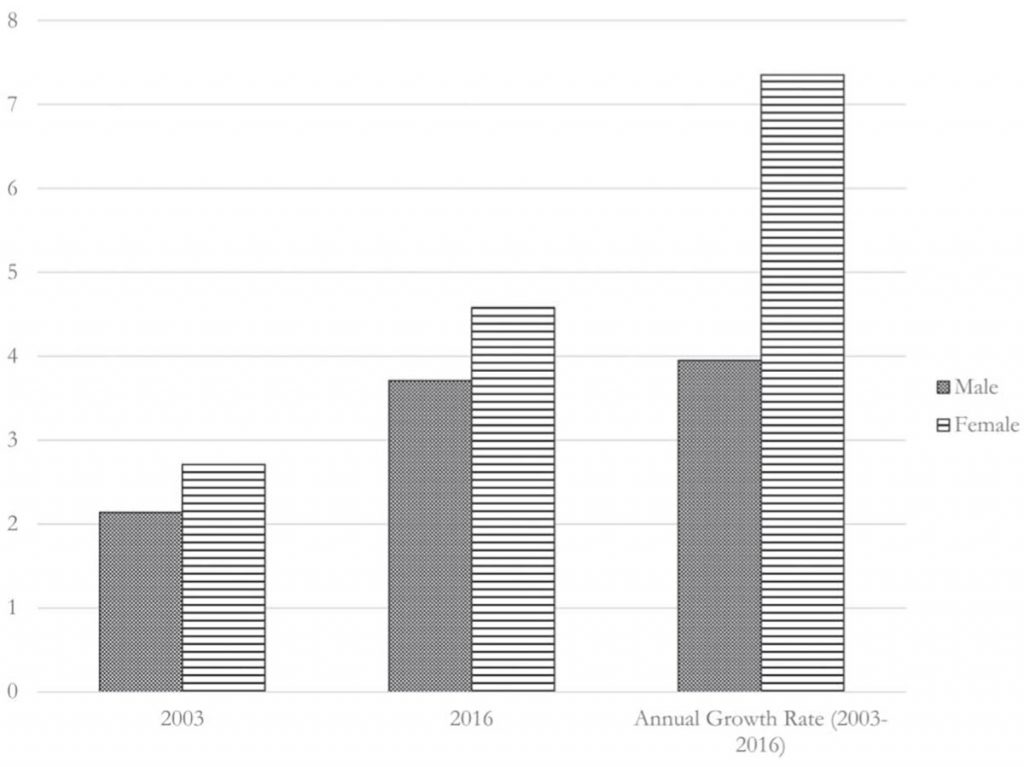Recep Tayyip Erdoğan's authoritarian AKP has governed Turkey for more than twenty years. His regime has consistently rolled back gender rights. Despite this, many women continue to vote for the AKP. Why? Bengisu Savran suggests clientelism and welfare benefits may provide the answer
It is like we are connected. It is as if we have subscribed to it, and we feel like it… Of course, they work; the municipality is good and working. I have always voted for the AK Party. I am satisfied; I have never voted for any other party. I did not think about it
The above quote, in which a woman explains why she votes for the AKP, is from a survey by Konda Research Consultancy. For many years, AKP has sought to attract votes from poor women reliant on welfare benefits. The AKP gets these women's vote because of the material benefits they derive directly from the AKP regime.
Marlene Laruelle defines illiberalism as having four components:
Laruelle considers illiberal parties 'out of system' because they seek solutions to neoliberalism's problems. The AKP ordered Turkey's withdrawal from the Istanbul Convention. It worked stealthily to make abortion illegal. And the party has significant undemocratic tendencies.
Clientelism is an informal relationship between patron and client. In Turkey, clients (AKP voters) are gaining material benefits from the patron (the AKP-led government), which they could not receive other way. In return for welfare payments or material benefits, the client votes for the patron. The government thus continues to create AKP voters by getting poor people on its side.
President Erdoğan has claimed he does not believe in equality between women and men. He equated abortion with murder, labelled LGBTQ+ people deviants, and suggested women should have at least three children.
Erdoğan sends welfare recipients direct messages claiming the benefits are personal gifts from him
Vulnerable people in Turkey are eligible for benefits including coal and food, as well as money. The process is highly politicised, but according to Erdoğan's whims rather than state policy.
Erdoğan has sent benefit recipients text messages claiming the welfare is a personal gift from him to them. He chooses the place and timing of the distributions carefully. Most benefits are given out around locations in which Erdoğan's political support is likely to be stronger. Indeed, AKP-led municipalities provide less aid to neighbourhoods in which they cannot secure a political majority.
For his 2018 book Social Assistance Recipients: Labour, Livelihoods, Politics and Gender, Denizcan Kutlu interviewed numerous benefit recipients. One of Kutlu's interviewees, 'Veysel', lives in Turkey's Çankaya district, where the opposition party is in power. Veysel was adamant that if AKP had been in power, social aid would have arrived sooner.
The AKP's welfare regime is not only politicised but highly gendered. Gamze Çavdar's 2022 research shows the increase in welfare provision during AKP's tenure, and its gendered distribution. This graph reveals how welfare for poor women increased significantly after 2003. It also shows how AKP targeted poor women to win votes:

Kutlu's interviews also reveal how welfare programmes have significantly influenced women's voting preferences.
'Emel' says she feels close to the party from which the benefits come. She even prays for the AKP. The benefits she receives also affect her voting preferences. She consistently votes for Erdoğan and the AKP mayor of Ankara, Melih Gökçek. Emel says the benefits she receives are a major influence on this choice; she feels the AKP looks after her.
'Gülcan' says she is voting AKP because of the benefits she receives:
We ate his pasta and beans. Melih Gökçek has won for five years, thanks to us
Many poor women in Turkey, including Emel, worry that if the AKP lost power, they in turn would lose their benefits. Welfare provision in Erdoğan's name has thus fostered a closeness between poor women in Turkey and the AKP regime. These women feel cared for, and they regard Erdoğan as a father figure. In receipt of welfare benefits, poor women feel indebted to their benefactor, and the AKP consistently gets their vote.
No.31 in a thread on the 'illiberal wave' 🌊 sweeping world politics

This blog piece was written for the course 'Gendering Illiberalism', co-designed and co-taught by Andrea Pető (with TA Irfana Khatoon) and Alina Dragolea (with TA Oana Dervis) sponsored by CIVICA alliance universities Central European University (CEU) and the National University of Political Studies and Public Administration (SNSPA).